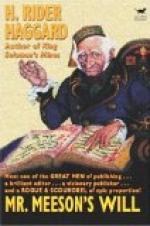Presently Lady Holmhurst got up from her chair, and said that she was going to bed, but that, first of all, she must kiss Dick, her little boy, who slept with his nurse in another cabin. Augusta rose and went with her, and they both kissed the sleeping child, a bonny boy of five, and then they kissed each other and separated for the night.
Some hours afterwards Augusta woke up, feeling very restless. For an hour or more she lay thinking of Mr. Tombey and many other things, and listening to the swift “lap, lap,” of the water as it slipped past the vessel’s sides, and the occasional tramp of the watch as they set fresh sails. At last her feeling of unrest got too much for her, and she rose and partially, very partially, dressed herself—for in the gloom she could only find her flannel vest and petticoat—twisted her long hair in a coil round her head, put on a hat and a thick ulster that hung upon the door—for they were running into chilly latitudes—and slipped out on deck.
It was getting towards dawn, but the night was still dark. Looking up, Augusta could only just make out the outlines of the huge bellying sails, for the Kangaroo was rushing along before the westerly wind under a full head of steam, and with every inch of her canvas set to ease the screw. There was something very exhilarating about the movement, the freshness of the night, and the wild, sweet song of the wind as it sang amongst the rigging. Augusta turned her face toward it, and, being alone, stretched out her arms as though to catch it. The whole scene awoke some answering greatness in her heart; something that slumbers in the bosom of the higher race of human beings, and only stirs—and then but faintly—when the passions move them, or when nature communes with her nobler children. She felt that at that moment she could write as she had never written yet. All sorts of beautiful ideas, all sorts of aspirations after that noble calm, and purity of thought and life for which we pray and long, but are not allowed to reach, came flowing into her heart. She almost thought that she could hear her lost Jeannie’s voice calling down the gale, and her strong imagination began to paint her hovering like a sea-bird upon white wings high above the mainmast’s taper point, and gazing through the darkness into the soul of her she loved. Then, by those faint and imperceptible degrees with which thoughts fade one into another, from Jeannie her thought got round to Eustace Meeson. She wondered if he had ever called at the lodgings at Birmingham after she left? Somehow, she had an idea that he was not altogether indifferent to her; there had been a look in his eyes she did not quite understand. She almost wished now she had sent him a line or a message. Perhaps she would do so from New Zealand. Just then her meditations were interrupted by a step, and, turning round, she found herself face to face with the captain.
“Why, Miss Smithers!” he said, “what on earth are you doing here at this hour?—making up romances?”




